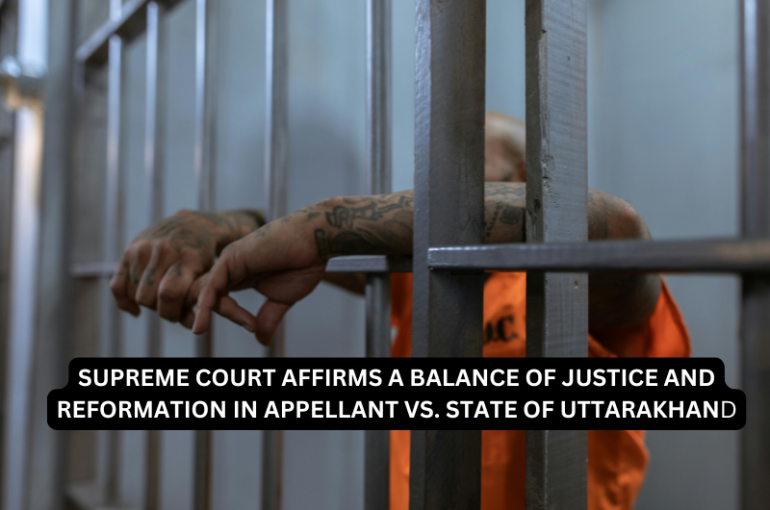SUPREME COURT DIRECTS QUASHING OF CRIMINAL PROCEEDINGS IN A FINANCIAL DISPUTE
Introduction:
The Hon’ble Supreme Court in the matter of Tarina Sen vs Union of India & Anr [Special Leave Petition (Criminal) No.1415 of 2024], in its judgement vide Order dated 03.10.2024 by the Division Bench of Justice B.R. Gavai and Justice K.V. Viswanathan, quashed the criminal proceedings, providing significant clarity on the scope of criminal prosecution following settlements in financial matters.
Background and Facts:
This case arises from the criminal proceedings initiated against five Accused, including the Appellants Tarina Sen and Shaileshree Sen, under the Indian Penal Code (IPC) and the Prevention of Corruption Act (PC Act).
The Appellants were Accused in connection with a loan fraud involving Allahabad Bank (Bank), Bhubaneswar, where a criminal conspiracy allegedly occurred between the Appellants (partners of Clarion Travels) and Ajay Kumar Behera, the Branch Manager of the Bank, among others.
The case was based on an FIR filed by the Central Bureau of Investigation (CBI) in the year 2000.
The Prosecution’s case, as outlined in the FIR, was based on two loan applications:
1) Clarion Travels Loan Fraud:
A loan of ₹8,40,000 was sanctioned by Ajay Kumar Behera for Clarion Travels without security, which was never repaid.
2) Indo Global Projects Ltd (IGPL) Loan Fraud:
A similar fraudulent loan of ₹11,84,600 was sanctioned for IGPL. Post-dated cheques deposited by IGPL bounced during clearing. Both Clarion Travels and IGPL shared the same address and had purportedly purchased cars from the same vendors, creating further suspicion.
Following an investigation by the CBI, a charge sheet was filed in the Court of Special Judge (CBI), Bhubaneswar in 2002. The Trial Court took cognizance and issued summons to the Accused.
The Bank filed Original Applications before the DRT for the recovery of the dues. A one-time settlement (OTS) was reached between the Bank and both Clarion Travels and IGPL in 2011, after which the loan accounts were declared closed.
The Appellants sought quashing of the criminal proceedings based on the OTS and approached the High Court of Orissa under Section 482 of the Code of Criminal Procedure (CrPC). However, the High Court allowed them to raise these pleas at the Trial Court level, rejecting their application to quash the case.
Aggrieved by the decision of the High Court, the Appellants approached the Supreme Court, contending that they had no active role in the alleged fraud and were merely relatives of the other Accused, and had settled their debts with the Bank.
Issues:
a. Whether the continuation of criminal proceedings was justified in the light of the settlement (OTS) between the Appellants and the Bank?
b. Whether the Appellants, who were relatives of the main Accused and partners in the implicated firm, played an active role in the alleged criminal conspiracy?
Appellants’ Submissions:
The Appellants argued that they had no direct involvement in the conspiracy, as they were only relatives of Accused No. 2. They further argued that the entire debt had been settled through the OTS, making the continuation of criminal proceedings unnecessary and unjust.
They cited various Supreme Court rulings where proceedings were quashed in similar financial disputes once settlements were reached. In support of their position, the Appellants relied on several Supreme Court judgments, including Nikhil Merchant v. CBI [(2008) 9 SCC 677], Gian Singh v. State of Punjab [(2012) 10 SCC 303], and Narinder Singh v. State of Punjab [(2014) 6 SCC 466], where criminal proceedings were quashed in cases involving settlement of financial disputes between the parties.
Respondent’s Submissions:
Despite the settlement with the Bank, the criminal conspiracy and acts of forgery, cheating, and corruption cannot be overlooked. The ASG argued that settling the financial dispute does not absolve the Appellants of their criminal liability. The learned ASG further submitted that the prosecution of the Accused is necessary to uphold public confidence in the Banking system and deter fraudulent activities.
Supreme Court’s Analysis and Judgment:
The Hon’ble Apex Court acknowledged that a full and final settlement had been reached between the Appellants’ firms and the Bank, and the loan accounts had been closed. The Court opined that, in the light of the settlement, continuing the criminal proceedings would be futile and would serve no purpose.
The Court observed that the case involved a commercial transaction and financial dispute between the parties, which had been amicably resolved. Following established judicial precedents, the Court held that criminal proceedings in such cases could be quashed where the possibility of conviction is remote, and the continuation would cause undue hardship to the Accused.
The Court noted that the Appellants, being related to the main Accused, were not directly involved in the fraud. Their names were added due to their familial ties, and their involvement in the actual commission of the crime was not substantial.
Referring to Nikhil Merchant, Gian Singh, Narinder Singh [(2008) 9 SCC 677], the Court reiterated that when disputes arising from commercial, financial, or matrimonial matters are amicably settled, criminal proceedings should ordinarily be quashed to avoid unnecessary hardship to the parties.
The Court quashed the High Court’s order and the criminal proceedings pending in the Special Judge (CBI) Court, Bhubaneswar, against the Appellants were set aside.
Ashita
Associate
The Indian Lawyer & Allied Servcies.





































Leave a Reply